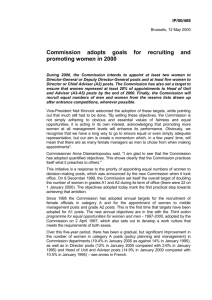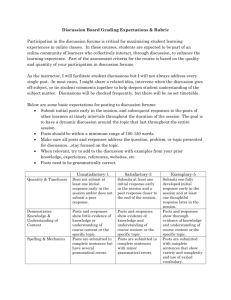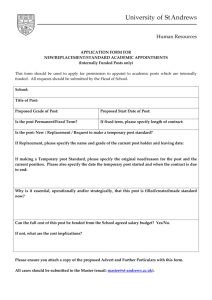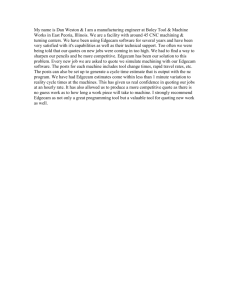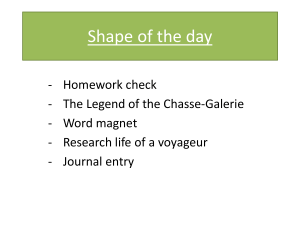English 205OL Syllabus Fall 2010 13459
advertisement
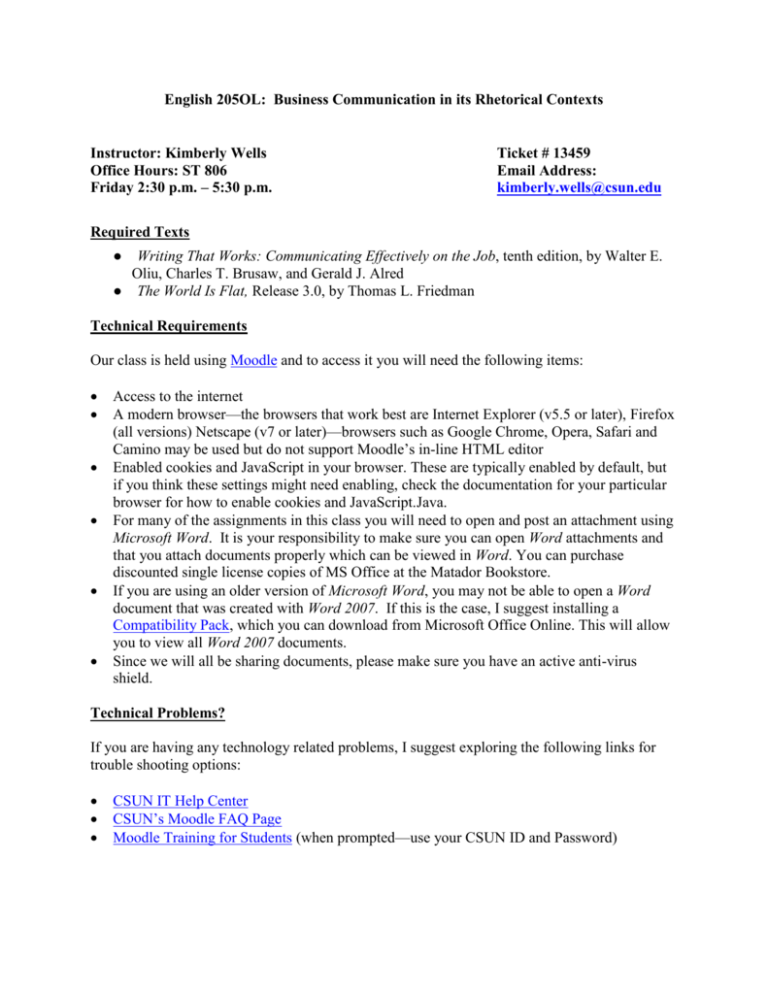
English 205OL: Business Communication in its Rhetorical Contexts Instructor: Kimberly Wells Office Hours: ST 806 Friday 2:30 p.m. – 5:30 p.m. Ticket # 13459 Email Address: kimberly.wells@csun.edu Required Texts ● Writing That Works: Communicating Effectively on the Job, tenth edition, by Walter E. Oliu, Charles T. Brusaw, and Gerald J. Alred ● The World Is Flat, Release 3.0, by Thomas L. Friedman Technical Requirements Our class is held using Moodle and to access it you will need the following items: Access to the internet A modern browser—the browsers that work best are Internet Explorer (v5.5 or later), Firefox (all versions) Netscape (v7 or later)—browsers such as Google Chrome, Opera, Safari and Camino may be used but do not support Moodle’s in-line HTML editor Enabled cookies and JavaScript in your browser. These are typically enabled by default, but if you think these settings might need enabling, check the documentation for your particular browser for how to enable cookies and JavaScript.Java. For many of the assignments in this class you will need to open and post an attachment using Microsoft Word. It is your responsibility to make sure you can open Word attachments and that you attach documents properly which can be viewed in Word. You can purchase discounted single license copies of MS Office at the Matador Bookstore. If you are using an older version of Microsoft Word, you may not be able to open a Word document that was created with Word 2007. If this is the case, I suggest installing a Compatibility Pack, which you can download from Microsoft Office Online. This will allow you to view all Word 2007 documents. Since we will all be sharing documents, please make sure you have an active anti-virus shield. Technical Problems? If you are having any technology related problems, I suggest exploring the following links for trouble shooting options: CSUN IT Help Center CSUN’s Moodle FAQ Page Moodle Training for Students (when prompted—use your CSUN ID and Password) Course Description Development of critical writing, thinking, research, and technology skills in the context of business. Through substantial writing and other work, students will hone their written, oral, and visual communication skills and their ability to find, synthesize, and make arguments based on primary and secondary sources. Emphasis on communication with a diverse audience and case studies about ethical issues common to the local and global business world. This course is required of students who have declared a major in Accountancy, Business Administration, Management, Marketing, Information Systems, or Finance. This class may also be taken as an elective by other students who wish to enhance their professional communication skills. Grades ● Individual Assignments 42% Grading Scale A 100-94 A- 93-90 B+ 89-88 B 87-83 BC+ C C- 82-80 79-78 77-73 72-70 ● Group Assignments 37% D+ D DF ● Discussions 21% 69-68 67-63 62-60 59 and below Group Assignments A significant portion of your grade in this class will be based on the final outcome of the group project, which will be developed based on several smaller group assignments that precede it. As the semester progresses, you will be given detailed assignment sheets explaining my expectations. Everyone will form their own groups through an interview process, so start taking note of people you want to work with and those you don’t (students who fail to actively participate in the class often have trouble finding classmates to work with on this project). The group project and all accompanying small assignments have specific due dates noted on the course schedule. Individual Assignments You will be responsible for many individual assignments throughout the semester, most of which will closely correspond to weekly readings from Writing That Works. As we progress, you will be given detailed instructions explaining my expectations for each one. All assignments have specific due dates, which are noted on the course schedule. Participation in Discussions Get involved! Your success, enjoyment, and learning in this course are closely related to how you engage the material presented as well as your peers. This portion of your grade is based on substantive replies to Discussion Questions and others’ posts. Most discussions are based on readings from The World Is Flat. Generally, I expect each response to include specific information from the week’s readings expressed in 150-300 words of thoughtful and well edited writing. Please see the Grading Rubric for Participation in Discussions for more information on how I will evaluate your posts. During weeks that require participation in discussions, you will need to post a minimum of three high quality posts in each discussion thread to earn full participation credit. You can earn participation points any time during the current week, or sooner if the discussion threads are available, but late posts will not earn credit. Our class weeks begin on Monday at 12:00 a.m. and end on Sunday at 11:59 p.m. Late Work I maintain a very strict policy in regard to late work, especially in the online classroom; otherwise, keeping accurate records of grades becomes quite difficult. If you frequently have trouble getting your work in on-time, this class is probably not well suited for you. All work must be submitted by 11:59 pm (PST) on the due date indicated on the course schedule. You will not be able to submit assignments after this time. Late work will only be accepted if you and I have come to an alternate agreement—this will be determined on an individual basis— and is very unlikely. Unless you have proof of an emergency, I reserve the right to refuse late work or make a significant point deduction. Individual technical difficulties, failing to attach your assignment properly or attaching the wrong document will not excuse late work—be prepared and double check your submissions. Disability Issues Please email me early in the semester if you require academic accommodations based on a documented disability. Further information: CSUN Center On Disabilities National Center On Deafness Policy on Plagiarism DON’T DO IT!!! Plagiarism is the act of “intentionally or knowingly representing the words, ideas, or work of another as one’s own in any academic exercise” (CSUN catalog, page 553). Plagiarism is grounds for disciplinary action by the university, including expulsion. Netiquette Just like society has rules of conduct governing interactions in the face-to-face environment; the virtual community also has rules of conduct for electronic interactions. The term netiquette is used to refer to online etiquette. Following these rules will improve the readability of your messages and will help others handle the large volume of information in an online classroom. Recommendations include the following: Stay on topic. While discussion is encouraged in online classrooms, rambling and tangential conversations may not be conducive to a quality learning experience. Use appropriate subject lines in your replies. As a conversation evolves, it’s helpful to change the subject line of a threaded message to reflect the changing topic. For example, if the subject line reads "Oral Presentations" and the conversation has now evolved into a discussion of PowerPoint, change the subject line to “PowerPoint” in your reply. Add multiple comments directly into messages in your replies. While a straight-forward reply is usually appropriate, interspersing your comments throughout an original posting may be more effective if you wish to respond to multiple points. For example, interspersing ***multiple*** comments in the body of the original message ***like this*** increases the readability of a response that addresses various points. Avoid ''I agree'' and ''Me, too!'' messages. Spending time reading messages without substance can be frustrating for all parties. Avoid the use of all caps. (IT'S LIKE SHOUTING!) Use caps occasionally for strong emphasis, but only for individual words. Avoid writing errors, even when "talking" with one another. Messages in the Discussion Forum are conversational and often informal; thus, they are prone to occasional grammatical, spelling, and typographical errors. Be sure to consistently post intelligible messages despite the informality of the environment. Carefully choose the format for your messages. Long paragraphs are difficult to follow onscreen. As a general rule, limit each paragraph to five to seven lines. Avoid fonts that are difficult to read because of style, color, or size. In addition, do not use stationery, as it adds to download time. Avoid responding when emotions are running high. For example, if you are angry, put your message aside. Remember, the ability to write and save messages for later review is one of the advantages of asynchronous learning. All Information on this Syllabus is Subject to Change Please Scroll Down to View the Course Schedule. English 205OL — Course Schedule — Fall 2010 Week 1: 8/23/10 – 8/29/10 8/27/10 Get Comfortable Using Moodle—Print Out and Thoroughly Read Syllabus, Read All of My Available Posts, Make Sure You Understand How to Access Discussions and Assignments, Officially Check-In 8/29/10 Due: Week 1 Discussion Posts Week 2: 8/30/10 – 9/05/10 Read Writing That Works – “Part One: The Writing Process,” “Chapter 7: Designing Documents” (209-220) & “Chapter 8: Understanding the Principles of Business Communication” (275315) The World is Flat – “Chapter 1: While I Was Sleeping” 9/01/10 Due: Academic Writing vs. Business Writing Assignment 9/05/10 Due: Week 2 Discussion Posts Week 3: 9/06/10 – 9/12/10 Read Writing That Works – “Chapter 7: Designing Documents” (209-220) & “Chapter 8: Understanding the Principles of Business Communication” (275-315) The World is Flat – 2 of the 10 sections (or “Flatteners”) in “Chapter 2: The Ten Forces That Flattened the World” 9/08/10 Due: Email Messages Assignment 9/12/10 Due: Week 3 Discussion Posts Week 4: 9/13/10 – 9/19/10 Read The Assignment Sheet for the Group Project Writing That Works — “Chapter 16: Writing an Effective Letter of Application” (602-608) The World is Flat – “Chapter 4: The Great Sorting Out” 9/15/10 Due: Letter of Application Assignment 9/19/10 Due: Week 4 Discussion Posts Week 5: 9/20/10 – 9/26/10 Read The Assignment Sheet for the Group Project Writing That Works — “Chapter 16: Preparing an Effective Resume” (578-601) The World is Flat — “Chapter 5: America and Free Trade” and Supplemental Articles 9/22/10 Due: Resume Assignment 9/26/10 Due: Week 5 Discussion Posts Week 6: 9/27/10 – 10/03/10 Read The World is Flat – choose one – “Chapter 6: The Untouchables” OR “Chapter 7: The Right Stuff” 9/29/10 Post Letter of Application and Resume for Group Project Interviews 10/03/10 Due: Week 6 Discussion Posts Week 7: 10/04/10 – 10/10/10 Read The World is Flat – choose one – “Chapter 8: The Quiet Crisis” OR “Chapter 9: This Is Not a Test” 10/06/10 Due: Group Project Team Information Assignment 10/10/10 Due: Week 7 Discussion Posts Week 8: 10/11/10 – 10/17/10 Read Writing That Works — “Chapter 5: Collaborative Writing,” “Chapter 6: Researching Your Subject,” “Chapter 7: Designing Documents and Visuals,” “Chapter 9: Writing International Correspondence (343-352),” “Chapter 14: Giving Presentations and Conducting Meetings,” and “Chapter 15: Writing for the Web: Rhetorical Principles” (These are the same as the readings listed on the Group Project Assignment Sheet and I do not expect you will read every word of every section, but that you will use them as guides for the work you will produce for the Group Project.) The World is Flat – “Chapter 10: The Virgin of Guadalupe” 10/13/10 Due: Group Project Policies and Responsibilities Assignment 10/17/10 Due: Week 8 Discussion Posts Week 9: 10/18/10 – 10/24/10 Read Writing That Works —“Chapter 2: Organizing Your Information” and “Chapter 6: Researching Your Subject” (You will likely use these chapters as references rather than reading every word) The World is Flat – “Chapter 11: How Companies Cope” 10/20/10 Due: Group Project Topic Outline and Annotated Bibliography Assignment 10/24/10 Due: Week 9 Discussion Posts Week 10: 10/25/10 – 10/31/10 Read Writing That Works – “Progress Reports” (361-365)\ The World is Flat – choose one from the following options – “Chapter 12: Globalization of the Local” and “Chapter 13: If It’s Not Happening, It’s Because You’re Not Doing It” OR “Chapter 13: If It’s Not Happening, It’s Because You’re Not Doing It” and “Chapter 14: What Happens When We All Have Dog’s Hearing?” 10/27/10 Due: Group Project Progress Report Assignment 10/31/10 Due: Week 10 Discussion Posts Week 11: 11/01/10 – 11/07/10 Read Writing that Works, subdivisions of Chapter 8 “Structuring Effective Correspondence” pages 283-292 and “Writing and Formatting Memos” pages 303-305 as well as “Adjustments” in Chapter 9 pages 336-341 The World is Flat – “Chapter 15: The Unflat World” 11/03/10 Due: 205 Common Assessment Assignment 11/07/10 Due: Week 11 Discussion Posts Week 12: 11/08/09 – 11/14/10 Read The World is Flat – “Chapter 16: The Dell Theory of Conflict Prevention” 11/14/10 Due: Week 12 Discussion Posts Week 13: 11/15/10 – 11/21/10 11/21/10 Due: Group Project Week 14: 11/22/10 – 11/28/10 Read The World is Flat — “Chapter 17: 11/9 Versus 9/11” 11/24/10 Due: Group Project Reflection and Evaluation Assignment 11/28/10 Due: Week 14 Discussion Posts Week 15: 11/29/10 -- 12/05/10 12/05/10 Due: Week 15 Discussion Posts Week 15: 12/06/10 -- 12/08/10 (not a full week) 12/08/10 Due: Final Essay All Information on this Course Schedule is Subject to Change

